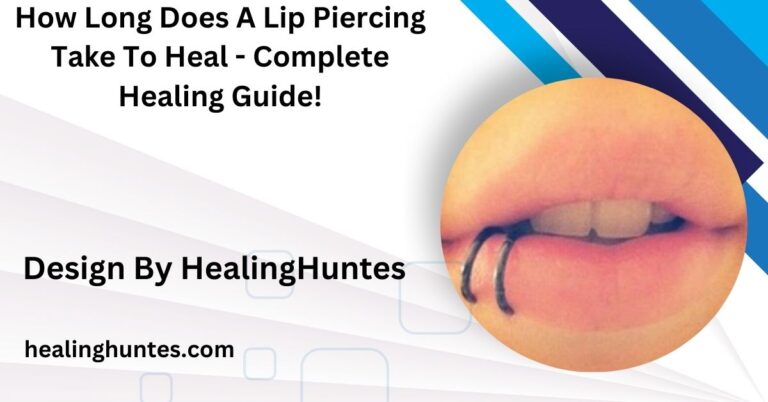How Long Does It Take To Heal From Hernia Surgery – A Complete Guide!
It typically takes about 2 to 6 weeks to recover from hernia surgery, with full recovery taking up to 3 months depending on individual factors.
In this article, we will explore how long it takes to heal from hernia surgery, the factors that influence healing, and tips for a faster recovery.
Understanding Hernia Surgery and Recovery Time:

Hernia surgery involves repairing the opening or weak area where a part of an organ or tissue has protruded. There are two main types of hernia surgeries—open surgery and laparoscopic surgery both of which come with distinct recovery timelines.
Open Surgery and Recovery Time:
Open hernia surgery involves making a larger incision at the site of the hernia. The surgeon will push the protruding tissue back into place and secure it with stitches or mesh. Due to the larger incision and more invasive procedure, recovery from open surgery typically takes longer.
Laparoscopic Surgery and Recovery Time:
Laparoscopic hernia surgery is a minimally invasive procedure. The surgeon makes a few small incisions and uses a camera and special tools to repair the hernia. Because the surgery involves smaller incisions and less tissue manipulation, patients generally experience less pain and can recover more quickly compared to open surgery.
Factors Affecting Recovery Time After Hernia Surgery
The healing process after hernia surgery is influenced by several factors, including the type of surgery, the patient’s health, and the care taken during the recovery phase. Let’s take a closer look at some of these factors:
Age and Overall Health:
Age plays a significant role in recovery time. Younger patients typically heal faster than older adults due to more resilient tissue and better overall health. If you are in good health with no underlying conditions, your body will likely repair itself more efficiently. However, older adults or patients with chronic conditions like diabetes, heart disease, or obesity may experience slower healing due to decreased circulation or immune response.
Also Read: How Long Does It Take To Heal From Cataract Surgery – Expert Advice!
Type of Hernia and Surgical Approach:
The size and location of the hernia, as well as the method used for surgery, directly affect recovery time. Larger hernias or more complex repairs may require a longer healing period. Additionally, laparoscopic surgery typically involves a faster recovery time compared to open surgery, due to the smaller incisions and reduced trauma to surrounding tissues.
Post-Operative Care and Compliance:
How well you follow post-operative care instructions is critical to a smooth recovery. Adhering to your surgeon’s instructions regarding rest, medication, and activity limitations will help you heal faster and reduce the risk of complications. If you try to resume normal activities too soon or ignore post-operative advice, it could prolong recovery time and lead to further issues, such as hernia recurrence or infection.
Timeline for Recovery After Hernia Surgery

Recovery time varies depending on the type of surgery, the individual’s health, and how well the surgical site heals. Below is a typical timeline for recovery after hernia surgery:
First Week After Surgery: Initial Healing and Rest
The first week after hernia surgery is usually when patients experience the most discomfort. Pain and swelling are common, especially for those undergoing open surgery. During this time, it’s essential to rest and avoid any strenuous activity. Most patients will be advised to avoid heavy lifting, bending, or even walking for extended periods.
Two to Four Weeks: Gradual Improvement and Light Activity
By the second to fourth week, many patients begin to feel significantly better. The pain and swelling typically subside, especially for those who underwent laparoscopic surgery. Light activities such as walking can usually be resumed at this stage. However, more intense physical activities, such as running, lifting heavy objects, or participating in sports, should still be avoided.
Four to Six Weeks: Return to Normal Activities
At four to six weeks post-surgery, most patients are ready to resume moderate activities. This includes walking, driving, and returning to work, particularly for those who had laparoscopic surgery. Open surgery patients may still need to take it easy during this time, but they can begin to incorporate gentle activities into their routine.
Also Read: Pinched Nerve Healing Signs – What to Expect as You Heal!
Two to Three Months: Full Recovery and Resuming Physical Activity
For full recovery, most patients need two to three months. At this point, the surgical site should be well-healed, and patients can usually return to all physical activities, including heavy lifting and exercise. However, full recovery may vary depending on individual factors like the type of surgery, health conditions, and the body’s ability to heal.
Tips for a Faster Recovery:
There are several steps you can take to help speed up your recovery process after hernia surgery. Here are a few important tips to follow:
Rest and Follow Medical Advice:
Getting plenty of rest in the first few weeks after surgery is crucial to your recovery. Avoid rushing back into work or exercise before your body is ready. Follow your surgeon’s instructions closely, including taking prescribed pain medications and attending follow-up appointments.
Gradual Increase in Physical Activity:

While rest is essential, gentle movement is also important for promoting blood circulation and preventing complications like blood clots. Start with light walking and avoid high-impact activities until you are cleared by your doctor. Gradually increase your activity levels based on your doctor’s recommendations.
Nutrition and Hydration:
A healthy diet that includes lean proteins, fruits, vegetables, and whole grains is vital for tissue repair and overall recovery. Nutrients like vitamins A and C, as well as zinc, are particularly beneficial in the healing process. Staying hydrated is equally important for reducing inflammation and supporting your body’s natural healing processes.
Avoid Smoking and Alcohol:
Smoking and alcohol consumption can slow down your recovery and increase the risk of complications. Smoking restricts blood flow and decreases oxygen delivery to tissues, while alcohol weakens the immune system and can impair healing. To promote faster recovery, avoid smoking and drinking during the healing phase.
Manage Pain and Swelling:
Take your prescribed medications as directed to manage pain. Ice packs and over-the-counter pain relievers can help control swelling and discomfort. If you notice any increase in pain or swelling that doesn’t subside with medication, contact your doctor.
Also Read: How Long Does A Pinched Nerve Take To Heal – Pinched Nerve Healing Time!
Signs of a Successful Recovery
During your recovery, there are several signs that indicate you are healing properly, including:
- Pain reduction: A decrease in pain levels and discomfort over time suggests that healing is progressing well.
- Decreased swelling: Swelling should gradually decrease in the first few weeks.
- Improvement in mobility: Increased range of motion and the ability to move more freely indicate your muscles and tissues are healing effectively.
- Absence of infection: A clean, dry incision with no signs of redness or pus indicates that the surgical site is healing correctly.
Potential Complications That May Affect Healing
While most patients recover without issues, complications can sometimes arise. These may include:
- Infection: Infections at the surgical site can delay recovery and may require antibiotics or further treatment.
- Hernia recurrence: If the hernia returns, you may need additional surgery.
- Chronic pain: Some patients experience ongoing pain, which may require further treatment.
- Blood clots: Rarely, blood clots can form and require immediate medical attention.
FAQ’s
1. How long does it take to heal from hernia surgery?
Recovery time usually takes between two and six weeks, but full recovery can take up to three months depending on the type of surgery and your overall health.
2. Can I return to work after hernia surgery?
Most patients can return to work within two to four weeks, depending on the type of work they do. Those with physically demanding jobs may need more time off.
3. When can I drive after hernia surgery?
Typically, you can resume driving when you are no longer taking prescription pain medications and can move freely without discomfort, usually within two to four weeks.
4. How can I tell if my hernia surgery is healing properly?
Normal healing signs include reduced pain, swelling, and improved mobility. The incision should be clean, dry, and free of infection.
5. Can I lift heavy objects after hernia surgery?
It is recommended to avoid lifting heavy objects for at least six weeks after surgery to avoid stress on the healing area.
Conclusion
Recovering from hernia surgery is a gradual process, and the time it takes for full healing depends on various factors such as the type of surgery, your overall health, and how well you follow post-operative care instructions. While most patients can resume light activities within two to four weeks, it can take up to three months for a full recovery, especially if more invasive surgery was required.






